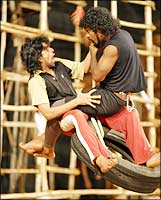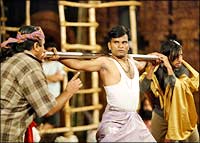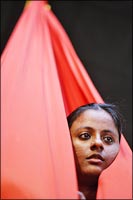 Under the stars of the Mumbai suburbs, Shakespeare's A Midsummer Night's Dream first written in the mid-1590s -- was brought to life in yet another novel manner. It happened under the control of director Tim Supple, who decided to add an interesting dimension to the stage.
Under the stars of the Mumbai suburbs, Shakespeare's A Midsummer Night's Dream first written in the mid-1590s -- was brought to life in yet another novel manner. It happened under the control of director Tim Supple, who decided to add an interesting dimension to the stage.
Bamboo had been used to create two scaffoldings at the back of the stage, where a major part of the play was enacted. Ropes were hung from the ceilings, actors scampering up them with great agility. Some of them even sang and danced to an entire song high up in the air!
So, instead of the usual horizontal stage we are used to, what we got was a play in two dimensions. Moreover, as the entire play is set in a forest, the stage floor was covered with red mud, in which the actors freely rolled. Two of the characters, Hermia and Helena, in fights among themselves and against their men, freely threw this mud into their opponents' eyes.
 There were seven languages spoken by the actors. And no attempt to explain or translate. The director expected the audience to follow it all by the actors' body language. The surprising thing is, it worked, and to a very large extent at that. And here's another interesting thing that happened. Whenever a particular language was spoken, a certain group in the audience would relate to it, laugh out loud and applaud. It was as if each of the seven languages had supporters in the audience. Each language was an umbilical chord that attached the actor on stage to the people who could understand it.
There were seven languages spoken by the actors. And no attempt to explain or translate. The director expected the audience to follow it all by the actors' body language. The surprising thing is, it worked, and to a very large extent at that. And here's another interesting thing that happened. Whenever a particular language was spoken, a certain group in the audience would relate to it, laugh out loud and applaud. It was as if each of the seven languages had supporters in the audience. Each language was an umbilical chord that attached the actor on stage to the people who could understand it.
Seven languages and one classic
One
At one point, it was difficult to say whether one was watching a play or spending an evening at the circus!
Although the fairies had the least lines, they made a great impact with their idea of fun and frolicking. The fight and eventual compromise between the Queen of the Amazon and Duke of Athens was also enacted very well. It was very obvious that the Queen was a master of dance, and the King a master of the martial arts.
 The two young couples Lysander and Demetrius, Helena and Hermia -- were good in the dialogue department, but tended to overact a bit while enacting their love or fighting with each other. Enacting a tender moment of love is a lot different from enacting a scene from the Kamasutra. At some points, it looked as if they had forgotten Shakespeare completely and were doing scenes they thought the audience would like.
The two young couples Lysander and Demetrius, Helena and Hermia -- were good in the dialogue department, but tended to overact a bit while enacting their love or fighting with each other. Enacting a tender moment of love is a lot different from enacting a scene from the Kamasutra. At some points, it looked as if they had forgotten Shakespeare completely and were doing scenes they thought the audience would like.
Now for other aspects of the play. The music, for one, which was very good, and very appropriate. At times, it sounded like it came from Shakespeare's era; at other times, like something you would hear in the villages of India today. The costumes were from sixteenth century Europe, India and Sri Lanka, and the sets were excellent.
All said and done, it proved that Shakespeare still has an audience, no matter where in the world. The standing ovation at the end, then, came as no surprise.






 © 2025
© 2025